
Despite the discussion over reducing Test cricket from five days to four, Anil Kumble, former India captain and ICC cricket committee chairman, believes that the longest form of the game will continue to enjoy support in the playing community for lot longer than is being predicted.
Kumble was talking about the demands of the T20 age and the shifting of player priorities at an event in Bengaluru to launch former India Test opener and women's coach WV Raman's book The Winning Sixer: Leadership Lessons To Master.
Talking about leadership on a panel with Raman and TVS executive vice- president P Madhavan, Kumble said he did not believe player priorities had shifted dramatically despite the success of T20 franchise cricket.
"I don't think so. I think everybody wants to play Test cricket, that's very clear." The generation of cricketers, Kumble said, "certainly want five-day cricket and that's something very obvious… there is some challenge in keeping everyone focused and pushed towards playing domestic competition specially Ranji Trophy." He commended players returning to first-class cricket to find their feet in the game again, a practice he said needed to be encouraged.
A marked change in Indian cricket today he said was the palpable separation of the teams between formats, with very few being dead certainties across formats. In India, only captain Virat Kohli and in the recent past, opener Rohit Sharma and bowlers Mohammed Shami, Jasprit Bumrah have belonged to that list.
"Very few players are common to formats and it's getting lesser and lesser," Kumble said. "But I don't think there is any dearth of people wanting to play the longer format. I think everybody wants to, they realise that's the biggest challenge and I'm sure that's going to be the case for a long time."
Kumble's advice to the Gen Z cricketer was simple: to be aware that they cannot let their guard down at any time. "You just need to be at it. There are a lot more opportunities for you to come back so that's the one thing that is an advantage. To not look for anyone else to chart their careers out for them.
"One thing I would tell any youngster is don't look at somebody… Selectors are there to actually drop you, not pick you. Because you pick yourself. At the end of it, your performances count and then you certainly pick yourself. The selector or whoever is picking you is there to drop you not really to pick you… that I think one must be aware of."
Asked to name the single quality they look for in youngsters to judge whether they were in for the long haul, Raman said apart from talent itself, "a good indication is the pace at which a young player improves. Everything else is secondary." To Kumble it was, "I'd like to look at how he bounces back after failure. How he comes back from a bad game, how he comes out of it."
Kumble accepted that the demand on the modern player in India was both in terms of tougher competition and more intense scrutiny. "One failure and heavens come down on you, that's the part you need to be mature about handling. But you currently also have more opportunities to come back and show case your talent - in IPL or Ranji Trophy or any other format. It's understanding what roles you play." As for distractions Kumble said, while each era had its own share, dealing with it was the job of the player.
"Yes there is social media now, but even when we were playing you had everyone else who was an expert- of what I should be bowling and how I should be bowling and when I should be bowling, and per se on whether India should bat first or bowl first or which bowlers should bowl at what time, those comments were always there."
Despite the 24X7 visibility of social media he said, the player's response needed to be identical across generations, "Every generation just has to make sure that you stay away from all that and focus on all that you need to do, on that particular day and what your goal needs to be."
As for the heightened criticism from social media, Raman said players needed to adapt a "convenient memory." The players' job was "to try and be better than can, next time around. You don't sulk or get absolutely overjoyed. It's a case of having a convenient memory. Don't moan keep going, that's what happens in sport."















 Phone: (800) 737. 6040
Phone: (800) 737. 6040 Fax: (800) 825 5558
Fax: (800) 825 5558 Website:
Website:  Email:
Email: 






